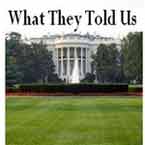
|
 |
What They Told Us:
Reviewing Last Week’s Key Polls
Saturday, March 05, 2011
President Obama once famously noted that “elections have consequences.”
Legislators in Washington, D.C. and Madison, Wisconsin can certainly
attest to the truth of that statement. Republican gains have translated
into major budget battles involving issues and programs that Democrats
have held dear for years.
The U.S. Congress is stalemated as Democrats fight $57 billion in
additional spending cuts Republicans want to make in the federal budget
for 2011, but most Likely Voters (53%) continue to believe that the
proposed GOP cuts aren’t very significant.
Most voters (58%) would rather have a partial shutdown of the federal
government than keep government spending at current levels. Democrats
overwhelmingly believe a shutdown would be bad for the economy but
Republicans and unaffiliated voters are evenly divided as to whether
the impact would be good or bad. Scott Rasmussen offers a closer look
at the shutdown numbers in a new video analysis.
Most voters still want to see the national health care law repealed,
too, and confidence that repeal will actually happen is on the upswing.
Belief that repeal will be good for the economy, however, has fallen to
its lowest level ever.
Voters continue to strongly prefer cuts in government spending to tax
increases, but for the first time in nearly two years, slightly more
voters (45%) would vote for a candidate who promises to raise taxes
only on the wealthy than one who promises to oppose all tax increases
(41%). Is it statistical noise or the beginning of a trend? We’ll see.
Fewer than half the nation’s voters believe the congressional agenda of
either major party is in the political mainstream. Just 32% describe
the agenda of Democrats in Congress as mainstream while 40% say the
same about the congressional Republican agenda as extreme.
Republicans now hold a six-point lead over Democrats – 45% to 39% - on
the Generic Congressional Ballot. The number of American Adults
identifying themselves as Republicans and Democrats fell for the second
straight month in February. Just 35.1% consider themselves to be
Republicans, while 34.3% call themselves Democrats.
Wisconsin Governor Scott Walker, a Republican, won his job last
November with 52% of the vote, but his popularity has slipped since
he’s taken on unionized public employees as a way to cut his state’s
growing budget deficit. Forty-three percent (43%) of Wisconsin voters
now at least somewhat approve of the job he is doing, while 57%
disapprove. Among those who voted for Walker last November, 77% approve
of his performance, while 93% of those who voted for his Democratic
opponent Tom Barrett disapprove.
Wisconsin voters continue to see spending cuts as the proper path to
solving the state’s budgetary woes. Forty-four percent (44%) believe
the state’s deficit should be reduced through spending cuts alone.
Another eight percent (8%) could see some tax cuts in the mix but would
prefer more spending cuts than tax hikes. A third of the state’s voters
(33%) believe that deficit reduction should include an equal mix of
spending cuts and tax hikes.
Still, most voters in Wisconsin oppose Walker’s efforts to weaken
collective bargaining rights for unionized public employees. However, a
plurality are supportive of significant pay cuts for state workers.
Walker’s moves have drawn national attention, and GOP governors in New
Jersey and Ohio have embarked on similar efforts to make unionized
public employees pay more for their health and pension benefits.
Sixty-six percent (66%) of voters nationwide think those who work for
the government get better retirement benefits than those who work for
private companies and also say it’s unlikely their state can afford the
benefits given to state workers. Only 13% think government employees
work harder than private sector workers.
Even a recent CBS News/New York Times poll found that a plurality (37%)
of American adults think labor unions have “too much influence on
American life and politics today.” Only half as many (19%) believe that
unions have too little influence. Twenty-nine percent (29%) say the
level of influence is about right.
Obama is siding with the protesting union workers which is perhaps no
surprise since the public employee unions overwhelmingly favor
Democratic candidates in elections. The number of voters who Strongly
Disapprove of the president’s performance inched up a point in February
to 39% in the Rasmussen Reports daily Presidential Tracking Poll. The
number who Strongly Approve of Obama’s performance dipped a point to
26%. The new figures generate a full-month Presidential Approval Index
rating of -13. The president’s approval index rating stayed between -14
and -17 for most of last year, with one exception in April when his
index improved to -11.
The Rasmussen Employment Index, which measures workers’ perceptions of
the labor market each month, inched up slightly in February. It’s up
nine points from a one year ago and 18 points from two years ago to the
highest reading since September 2008.
At the same time, however, 32% of American Adults think unemployment
will be higher in a year’s time. Only 27% expect the unemployment rate
to be lower one year from now. Private sector workers are more likely
than government employees to think unemployment will be higher. The
current numbers are more pessimistic than a month ago but similar to
results found last year at this time.
Economic confidence among small business owners remained steady in
February, according to the monthly Discover (R) Small Business Watch
(SM). Although a few more small business owners said the overall
economy is getting better, a rise in cash flow issues kept confidence
flat.
But at week’s end, the Rasmussen Consumer Index, which measures the
economic confidence of consumers on a daily basis, was at its lowest
level yet in 2011.
Read it with links at Rasmussen
|
|
|
|

